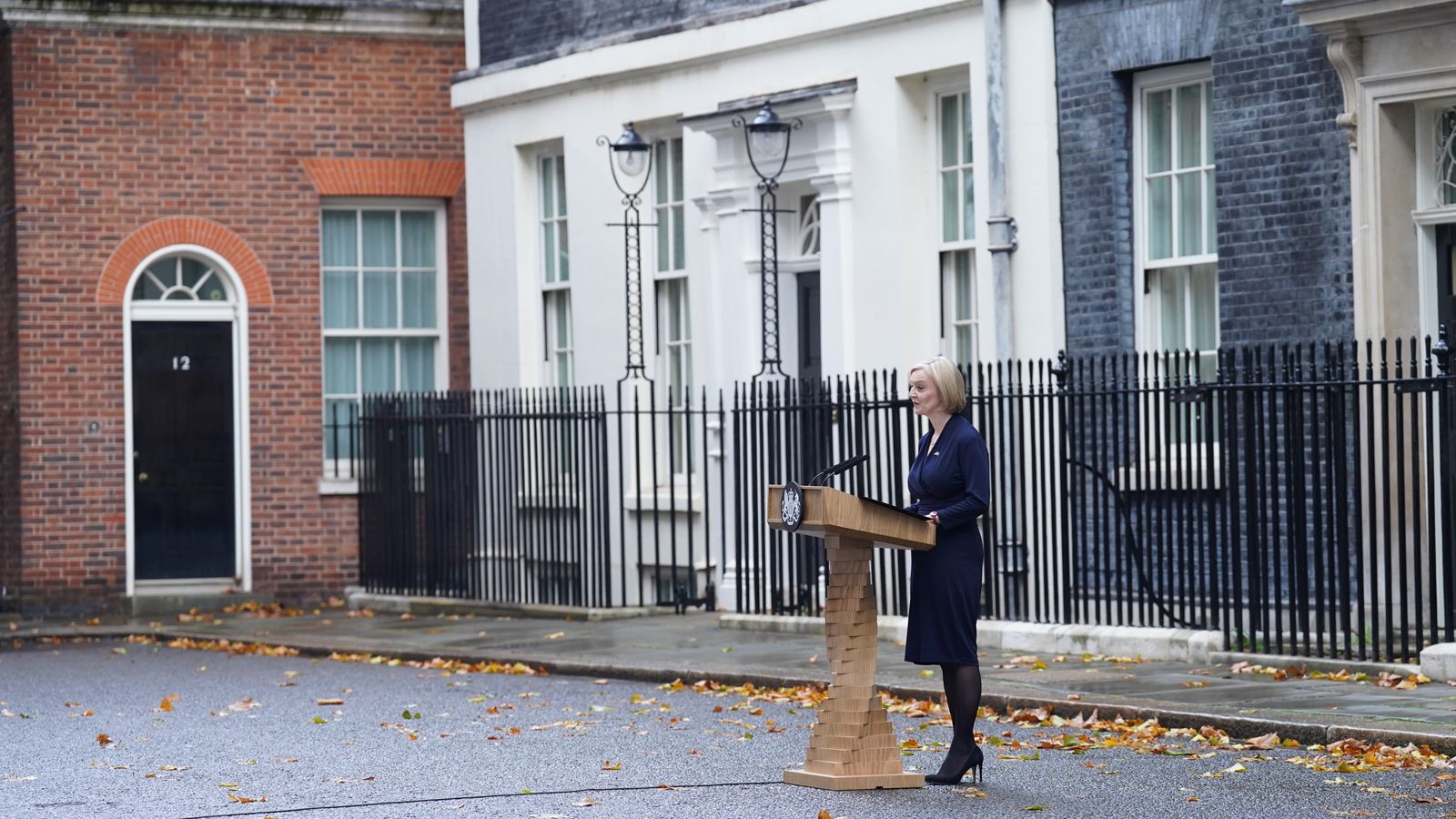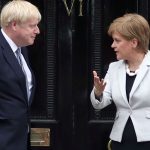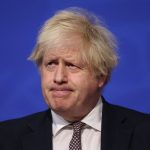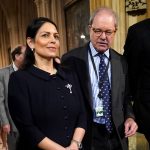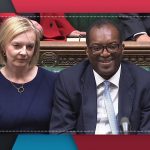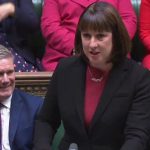In the end, Liz Truss lasted less than seven weeks in the job. Never the first choice of Tory MPs, the decisions she made as prime minister finished her off at record pace.
She will be, by some distance, the United Kingdom’s shortest-ever serving prime minister. Her allies promised “shock and awe” when she entered Number 10, but few predicted that she would turn Westminster into such a disaster zone.
Today, there’s a collective sense of shock, rather like the aftermath of a car crash, where you emerge from the wreckage dazed and confused, asking yourself what just happened.
In the case of the Truss administration, the question is how on earth did the wheels come off the government so quickly and spectacularly? And what does that mean for the Conservative Party, our politics and the country now?
Sunak favourite to be new PM as Truss resigns – live politics updates
The central mistake of Liz Truss was to treat the business of government rather like a continuation of her election campaign. She made all sorts of promises to party members – on tax cuts and on spending commitments in order to win them over. When she entered Number 10, she didn’t recalibrate or compromise.
I remember the interview I did with her just days before her mini-budget at the top of the Empire State Building in New York when she told me, “I am prepared to be unpopular,” in order to push through her economic plan. She perhaps thought it was a show of strength. It turned out to be incredibly foolhardy.
Liz Truss goes – could Boris Johnson be back?
The Conservatives can change PM, but not the economic hole they have dug
‘Lettuce all pray for Liz Truss’ – PM loses to vegetable in Daily Star stunt
It led to fatal errors that cost Ms Truss her job. Instead of consulting the markets, taking soundings from the Treasury, or even gauging the views of her cabinet properly, she and her then chancellor Kwasi Kwateng unleashed £45bn of unfunded tax cuts on the markets in a mini-budget that went even further than she had signalled in her leadership race.
I had thought when Ms Truss became prime minister, she might have stuck to commitments on tax cuts but staggered them in a way that might have been more palatable to the markets.
She did not, and she paid a heavy political price over the following weeks. Forced to U-turn on plans to scrap the 45p rate of tax, then sacking her chancellor before the incoming one, Jeremy Hunt, just about junked her entire economic plan. By Monday this week, it was clear that Liz Truss was a Prime Minister without a policy platform and out of control of her party.
Please use Chrome browser for a more accessible video player
Read more:
Truss becomes shortest-serving PM in history
Who is in the running to replace Liz Truss?
Starmer calls for general election
But the British public was also paying the price for her reckless decisions, with interest rates rising faster than had been anticipated before that mini-budget amid a cost of living crisis in which inflation hit a record 40-year high in September.
She has become one of the UK’s most unpopular prime ministers in the space of just a few weeks – with just one in ten Britons satisfied with her leadership. An unrecoverable position, it was clear to me after that fateful press conference where Ms Truss sacked her chancellor that the game was up – what was less clear was how it would end.
That ending was accelerated by the chaos of the fracking vote on Thursday night. Ahead of that horror show, senior influential figures in the party had told me that there was no appetite to remove Ms Truss before the critical fiscal statement on October 31.
They worried this could further unsettle markets: “The media mood I think is more febrile that the parliamentary mood,” one person familiar with the discussions of the 1922 committee told me soon after PMQs.
But that all changed after the evening of chaos, confusion of whips’ resignations and altercations in the voting lobbies between Conservative MPs.
“Everything that happened today could have been avoided, if it had been better managed,” remarked one wise former cabinet minister to me late on Wednesday night. “They didn’t have to create crisis points in terms of whipping votes. That they did is a symptom of where we are.”
But it did trigger a crisis – one which took a life of its own. As Boris Johnson said of his own infamous demise, “when the herd moves, it moves.” The momentum built and the party moved quickly. By Thursday lunchtime, Ms Truss announced she was out.
But the speed was also hastened not just by policy decisions but by politics. This was a prime minister who only ever had the public support of 42% of MPs, despite being nailed onto win for weeks.
It told us that Ms Truss was always going to have a problem winning over the parliamentary party, but instead of recognising her limitations and building a cabinet from different wings of the party, Ms Truss doubled down on winning power.
She kept Sunak supporters out of office and rewarded her allies. It meant that she was not sufficiently challenged by the cabinet in decision-making and failed to garner any goodwill from the wider parliamentary party.
There is also a view from those former cabinet ministers who were agitating from the outset that Ms Truss was never really up to the job in the first place. When her policy platform sparked such dire consequences, the public concluded that too. So she had to go.
But three prime ministers in four months and endless infighting – all during a cost of living crisis – is the worst possible advertisement of a party that wants to convince the public it is fit to lead the country.
Labour want a general election, calling the Conservatives a “coalition of chaos.” The public, meanwhile, are thoroughly fed up, with Labour now consistently polling 20 to 30 percentage points ahead of the Tories.
That is why 1992 chair Sir Graham Brady and the Conservative Party want to replace the prime minister within a week. It is an attempt to get on with the business of government and try to prove to the public that the Tories are capable of governing.
Please use Chrome browser for a more accessible video player
But the mood in the party is desperate. Senior MPs tell me they think there’s little chance of winning the next general election, and the latest iteration of this Conservative psychodrama is designed not to win but to try to limit the losses.
So this will be a short, sharp contest with the aim of installing a new PM within the week. Nominations close on Monday at 2pm, and any candidate who wants to stand has to win 100 nominations. As things stand, it looks to me that the only two candidates that could reach the threshold are Rishi Sunak, who won 137 votes in the last contest, and Penny Mordaunt, who reached 105.
If only one of the candidates crosses the magic 100 threshold, we will know on Monday who will be the next prime minister. The party knows it’s on borrowed time with a fulminating public. This has to end, and soon.
“We are deeply conscious – its imperative in the national interest – in resolving this clearly and quickly,” Sir Graham told me this afternoon.
Labour want a general election, the Conservatives will resist. But the question that is first and foremost in my mind, after the second bout of vicious bloodletting in the Conservative Party in just four months, is whether MPs can come together behind whoever takes over?
Some think the divisions and the grievances are just too deep. The Johnsonites will never accept Rishi Sunak; the Sunakites rounded on Ms Truss and might round on the next leader too, should their man not take the crown. We will have a new prime minister, but its hard to see how it stops the rot.
Watch a special programme tonight at 7pm with Dermot Murnaghan on Sky News
